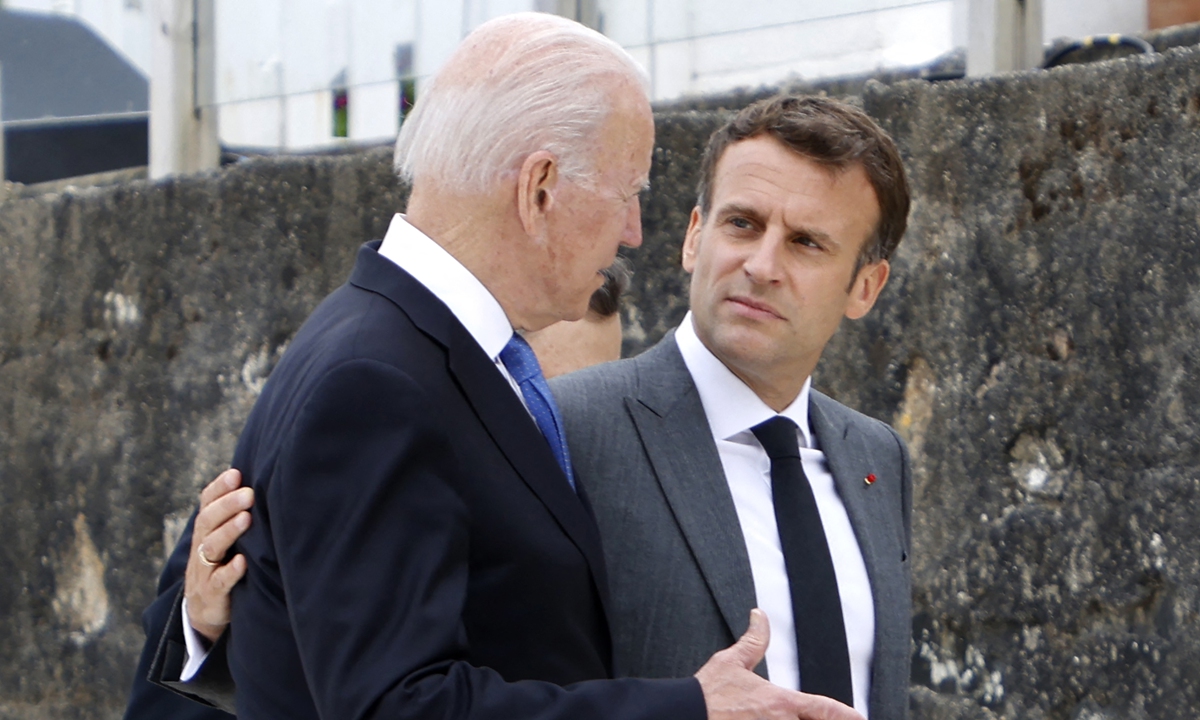
US President Joe Biden (left) and France's President Emmanuel Macron speak at the start of the G7 summit in Carbis Bay, Cornwall on June 11, 2021. Photo: AFP
US President Joe Biden and his French counterpart Emmanuel Macron had a "friendly" phone call Wednesday to defuse a deep row over submarine sales to Australia, promising to meet in person to repair the transatlantic relationship.
The call, which the White House said lasted about 30 minutes, was the first between Biden and Macron since France recalled its ambassador over the surprise US announcement of a deal to build nuclear submarines for Australia - scuppering a previous French deal to sell conventional submarines.
Paris called the US-Australian plan, which was launched as part of a new Indo-Pacific security group along with Britain, a stab in the back and also pulled its ambassador from Australia.
In a joint statement after the call, the two leaders vowed to launch "in-depth consultations... for ensuring confidence" and to meet in Europe at the end of October. The statement also said Macron would order France's ambassador back to Washington next week.
White House Press Secretary Jen Psaki told reporters the talk "was friendly" and Biden was "hopeful this was a step in returning to normal."
The statement said the US recognized the need for stronger European defense to complement the NATO military alliance, a key idea repeatedly floated by the French leader.
In what amounted to an acknowledgement of French anger, the English-language version of the statement issued by the White House said that the management of the dueling submarine deals "would have benefited from open consultations among allies."
The French-language version issued by the Elysee Palace was even more explicit, saying consultations "would have avoided this situation."
There was no word about where the October meeting will be but Biden will already be in Rome and Glasgow at that time for the G20 and COP26 climate summits.
At the annual United Nations summit, French Foreign Minister Jean-Yves Le Drian, after giving the cold shoulder for days, spoke with US Secretary of State Antony Blinken on the sidelines of a meeting and the two expected to meet again Thursday, a US official said.
France's Naval Group said it will send a detailed invoice in the coming weeks to Australia for cancelling the contract originally worth $36.5 billion.
As well as a huge commercial setback, the loss of the deal was also a blow to France's security strategy in the Indo-Pacific region, where it has a presence through overseas territories.
The submarine row plunged Franco-US ties into what some analysts viewed as the most acute crisis since the US-led invasion of Iraq in 2003, which Paris opposed.
British Prime Minister Boris Johnson showed he was out of patience, using a French-English mix to say it was "time for some of our dearest friends around the world to 'prenez un grip' (get a grip)."




